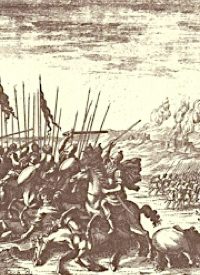
Why is it that so much of the world seems mired in hatreds, violence, slavery, and pain? The reason is not complex: Most of the Old World is a patchwork of empires. America was founded, specifically, to create a republic of ordered liberty and to reject the poison of empire. The British Empire, which America’s early settlers had left, was one of the more benign. The Commonwealth democracies of Canada, Australia, and New Zealand have separated from the United Kingdom gracefully and stayed on good terms with it. Still, would not everyone in Canada have been better off if the French in Québec had been left alone or, now, simply allowed — even encouraged — to form their own nation or a semi-independent polity?
But even within the British Isles, empire left wounds. The Irish will remember Easter 1916 for a long time. The problems of Northern Ireland, for now, are blessedly dormant. But will that last forever? The Scots still celebrate Braveheart. The original English (not British) Empire held much of France and was ended only after the Hundred Years War and the burning of Joan of Arc. When the British left India, millions died. When Ian Smith tried to establish a racially tolerant democracy in Rhodesia, Britain perversely denied independence to this colony and they now have the nightmare that is Zimbabwe.
Other empires have been worse. The Mogul Empire of India, which built lovely buildings, created hatreds between Hindus and Muslims that still exist. Two prime Ministers of India (an empire) were assassinated by religious or nationalist dissident minorities — the Sikhs killed Indira Gandhi, and the Tamils killed Rajiv Gandhi. India is a conglomeration of many native languages, a number of different religions (located in certain parts of the subcontinent), and different races (which, under Hinduism, have different status metaphysically). On top of that, some states of India — a land of presumed religiosity — have had Marxist governments for decades. Yet India, like Britain, is hardly the worst empire in the Old World.
The imperial battles in the heart of Africa, although their primitiveness does not draw our attention as easily, nevertheless are savage and murderous. Those of us who remember 40 years ago Biafra, the southeastern part of Nigeria whose Christian Ibos wanted simply independence, and the long civil war in which millions died, know that empire is an diabolical itch throughout the world. When Hutus and Tutsis each, in turn, hacked man, women and children to pieces so that the rivers were red and putrid with decaying bodies, we were reminded that the evil of empire is not connected with modernity or gunboats. White Muslims in Sudan kill black Christians in the south of Sudan. Egyptian Muslims terrorize the Christians of the ancient Coptic religion in the land of the Nile.
Americans ought to think very long and very hard about the almost irreconcilable problems of the Old World before offering more than peaceful, friendly relations with all who will be peaceful and friendly towards us. Are the problems there intractable? Maybe not intractable, but the problems of empires and subjects in the Old World are extremely resilient. Recent elections in Turkey remind us of that important fact.
Turkey is relatively democratic. Its brand of Islam is less strident that that of many Muslim nations. Turkey seeks to be part of the European Union, as it has long been part of NATO. But Turkey is an empire, as are Iraq and Iran. Just ask the Kurds. These ancient people occupy the northern corner of Iraq; they live in the western periphery of Iran; and they occupy a significant part of the Anatolian Peninsula.
Recent Turkish elections showed just how strong Kurdish separatism is in the Turkish Republic (Empire). The Turkish government has tried carrots and tried sticks, but the Kurds remain strongly inclined to independence. Unlike Iraqis and Syrians (some Kurds also live in Syria), the Kurds are not an Arab people. Their language is different from that of the overlords in Ankara, Teheran, Baghdad, and Damascus. The Kurdish people have made their desire fairly plain: It is to form a new (or, rather, a very ancient) nation — Kurdistan.
The Turkish government is not in favor of such a move, as it would reduce the size of Turkey by about one quarter. The Sunni and Shia of Iraq do not want this because Kirkuk is rich with oil. The mullahs of Iran dare not allow Kurdish independence because Iran, like India, is a conglomeration of different peoples, some of whom speak Farsi and consider themselves Iranian and some of whom do not. Of course the Kurds themselves do not come to the table with clean hands. Armenians were special victims of Kurds a century ago. Kurdish terrorism in Turkey has been indiscriminate, brutal, and murderous.
The lesson for America in the problems of Kurds and other ancient peoples with equally ancient grievances is this: We cannot solve, or even begin to solve, the problems of the world. The Kurds have been living in their mountainous part of West Asia, attacking and being attacked, for three thousand years. Is there nothing we can do about it?
Well, the answer depends upon what “we” means. Christian missionaries, independent of our government, very quietly go all over the world bringing a message of peace, very practical help in the form of private schools and free clinics, and an expression of love. That works, but not government by government, people by people, or region by region. Is there a solution to the problems of the Turks and Kurds? No, but there is a solution to the problem of every human soul, and no government can provide it.
Graphic: The Ottoman army battling the Habsburgs in Slovenia during the Great Turkish War of 1662–1699.



